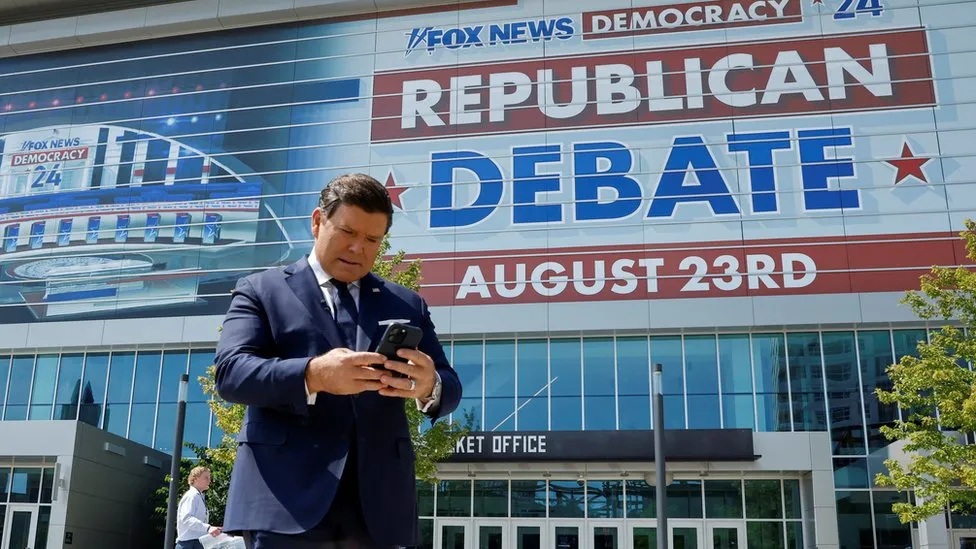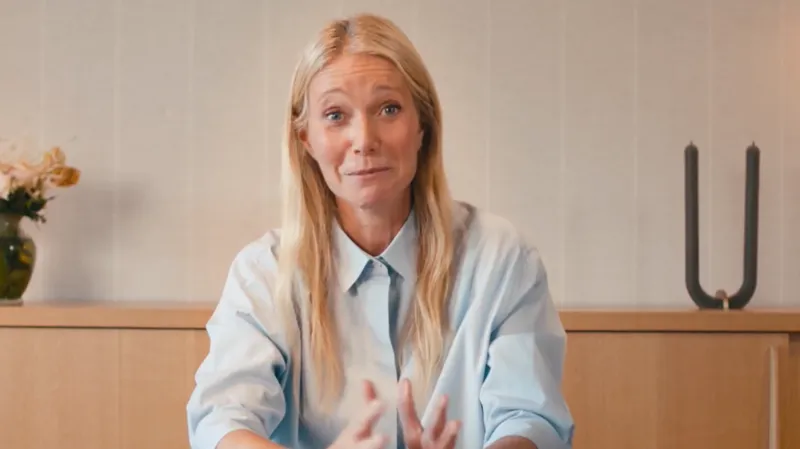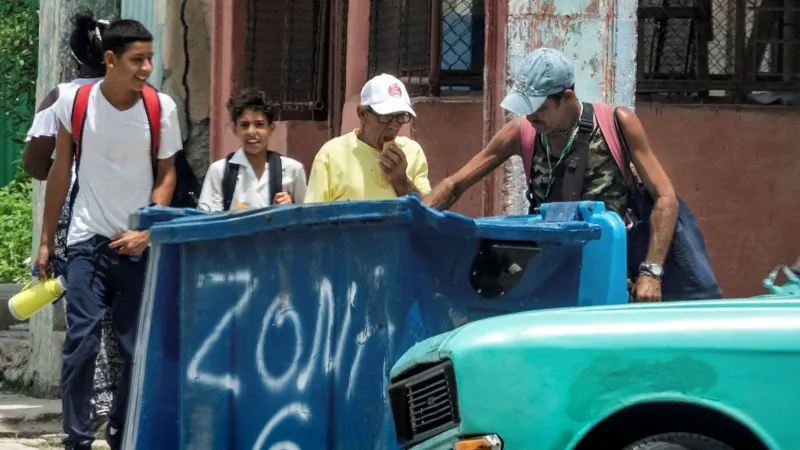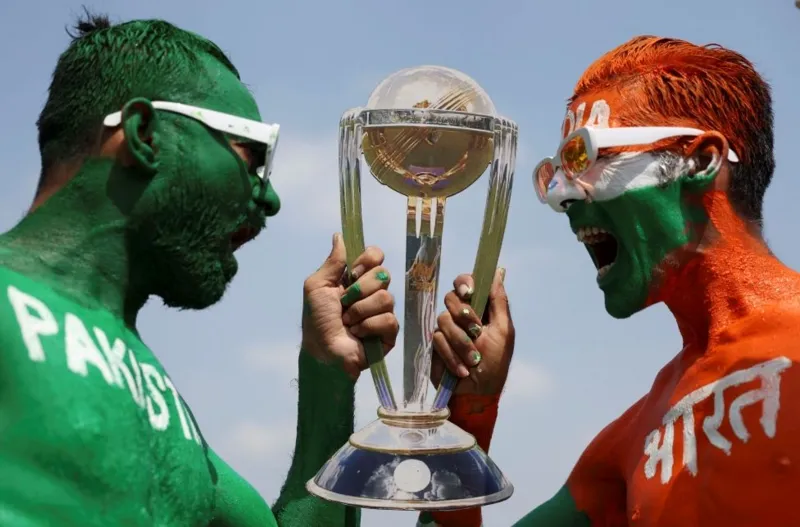Republican debate: Rivals seeking political oxygen in a Trump-less showdown
With one big exception, the leading Republican candidates for the 2024 White House race are gathering on Wednesday in Milwaukee, Wisconsin, for the first party-sanctioned primary debate.

The metaphorical elephant not in the room is former President Donald Trump.
His absence means the remaining candidates will have a harder time attracting the attention of Republican voters - and of making the case that they, not the nominee in the past two presidential elections, should be party's standard-bearer.
Republican opinion surveys show Mr Trump is the current choice of more than half of likely primary voters, so the rest of the field will have to find ways to highlight what they believe is wrong with him - and why they are the better choice.
Some are doing this directly; others in the most roundabout way. Time will tell which strategy is better - or if, given Mr Trump's dominant position, they all end up equally bad.
With that in mind, here's a look at the candidates who have qualified for the debate stage.
Ron DeSantis
The Florida governor's critique of the former president is that he was too frequently distracted and derailed during his time as president. If Mr Trump had been more focused, Mr DeSantis reasons, he would have accomplished more while in office.
Mr DeSantis has also criticised his fellow Florida resident for dwelling too much on the past - particularly his 2020 presidential election defeat - and being too mired in scandal to win the White House next year.
"If the election becomes a referendum on what document was left by the toilet at Mar-a-Lago, we are not going to win," he said during a recent campaign stop in Iowa, referencing Mr Trump's indictment for mishandling classified material after his time in office.
The Florida governor is presenting himself to Republican voters as a conservative who can produce the kind of results Mr Trump promised in 2016 but was unable to deliver. He points to his record as Florida governor, which includes loosening gun-ownership laws, restricting sex and gender identity education in schools, tightening voting rules, and limiting abortions.
It was a pitch that earlier this year seemed like it might be effective for party faithful interested in moving on from Mr Trump. Instead, it has fallen flat so far. The Milwaukee debate will be one of the best remaining opportunities for Mr DeSantis to resuscitate that message.
Mike Pence
The former vice-president has had to walk a fine line during his campaign. He is running on the same four-year record in office as his old boss, but wants Republican voters to opt for the understudy instead of the leading man.
The most obvious - and most potentially fraught - tactic is for the Indiana politician to highlight his refusal to give in to Mr Trump's pressure to overturn the results of the 2020 election.
"President Trump... demanded that I choose between him and the constitution," he said in his campaign announcement speech. "I chose the constitution, and I always will."
Beyond that, he has tried to differentiate himself by highlighting his long record of support for traditional conservative policies - on topics like abortion, taxes and foreign policy.
If polls are a guide, however, his message has alienated Trump supporters while failing to convince anti-Trump Republicans. On the debate stage, he'll have to figure out a way to pull at least some Republican voters in one of those two camps to his side.
Tim Scott
If Tim Scott has a beef with Donald Trump, he's not willing to share it publicly. Instead, the South Carolina senator has been running a relentlessly optimistic campaign, leaning heavily on his personal story of overcoming childhood poverty to become his state's first black senator.
He also frequently emphasises his personal religious beliefs, which stand in contrast to Mr Trump's less pronounced - and sometimes awkward - displays of faith.
His strategy seems to be not offending any Republican voters and using his substantial cash reserves - built up during Senate campaigns - to position himself as the de facto alternative to Mr Trump as other candidates fall by the wayside.
Nikki Haley
After the US Capitol riot by Trump supporters, Nikki Haley was fairly outspoken in her criticism of the former president, saying his actions since his election defeat would be "judged harshly by history".
It was a rather dramatic change of course for the woman who spent two years working for Mr Trump as US ambassador to the United Nations, and who received a warm Oval Office send-off from the president when she left the administration.
Although the former South Carolina governor backed away from her harsher critique in the run-up to launching her presidential bid, she has drawn some contrasts with her former boss, particularly on US support of Ukraine.
She has also emphasised her relatively young age - 51 - in a comparison that is explicitly directed at 80-year-old President Biden but could apply just as well to the 77-year-old Trump.
Vivek Ramaswamy
Vivek Ramaswamy's campaign strategy is straightforward: Metaphorically hug Donald Trump, and allow his youth and charismatic stage presence to win over the support of Trump-friendly voters who are looking for a new face unconnected to the political system.
The 38-year-old tech executive with no previous experience in elected office is the only candidate who has explicitly said he would use his presidential authority to pardon Mr Trump if he were convicted on federal charges. He is outspoken on gun rights, religious liberty and hot-button social issues, and has suggested requiring those under 25 to take a civics test or serve in the military or as a first responder before they are allowed to vote.
Mr Ramaswamy's ardent defence of the former president - and his recent rise in polls of Republican primary voters - could make him a debate target for other candidates looking to attack Mr Trump by proxy or just interested in taking the ambitious newcomer down a peg.
Chris Christie
Chris Christie was one of the first prominent Republican officeholders to endorse Donald Trump during his first presidential bid in 2016. Since then, he has heel-turned and become one of the former president's sharpest critics within the party.
He has called Mr Trump's efforts to reverse the results of the 2020 election, leading up to the US Capitol riot by his supporters, a "stain on our country's history". He said Mr Trump violated his constitutional oath and "brought shame to his presidency".
When he launched his presidential campaign, Mr Christie pointed to the Republican primary debates as an opportunity to dent Mr Trump's nomination hopes. With the former president absent from Milwaukee, however, he will be stuck directing his fire at an empty podium.
Doug Burgum
Little-known governor of North Dakota Doug Burgum garnered some media attention by qualifying for the debate stage in part by offering $20 gift cards to the first 20,000 people who donated at least $1 to his campaign.
The former tech executive, who is using his billion-dollar personal wealth to fund his campaign, is focusing on the economy and says he wants to run the federal government more like a business. When asked about Mr Trump, he tends to change the subject.
As the longest of longshot candidates on Wednesday's debate stage, he will probably be more concerned with simply trying to get Republican voters to remember his name.
Asa Hutchinson
Asa Hutchinson was once a popular conservative governor in Arkansas. His veto late in his term of a law restricting transgender medical treatment for children, and his criticism of Mr Trump, have dented his standing among many Republicans, however.
Like Mr Christie, he may try to use the Milwaukee debate to explicitly make the case that Mr Trump is an unsuitable nominee for the Republican party. After the Republican frontrunner's first indictment, Mr Hutchinson called for him to drop out of the race - and has repeated the demand in subsequent months.
Also like Mr Christie, however, the Arkansan's opportunity to dent Mr Trump's standing among Republican voters will likely be diminished by the former president's absence from the debate stage.
-bbc






